Unit 1 Festivals around the worldExtensive reading
高中英语 必修三 Unit1《Festivals around the world ---Reading》
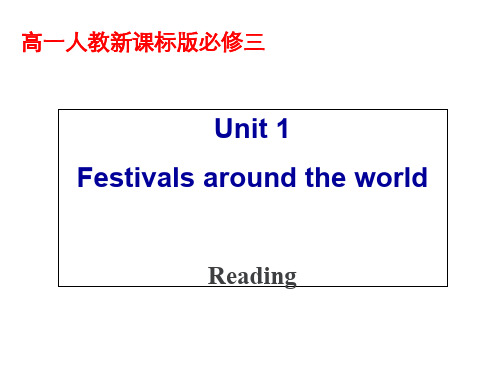
3. Qu Yuan was a great poet who people honor a lot in China. T
4. Mid-autumn Festival is held to celebrate the end of autumn. F
5. Easter celebrates the birth of Jesus. F
高一人教新课标版必修三
Unit 1 Festivals around the world
Reading
Guessing Compition:Guess what festival It is according to the picture you see as quickly as you can.
5. Name three things people do at Spring Festival.
eat dumplings, fish, meat; give children lucky money; dragon dances; visit family members
Festivals of the Dead: Fill in the blanks.
P 2. Festivals of the Dead Japan -----Obon Mexico------Day of the Dead America------Halloween P 3. Festivals to Honour People Dragon Boat Festival Columbus Day (India)October 2
2. Answer the following questions.
1. What are festivals of the dead usually for?
Unit-1-Festivals-around-the-world-课文知识点解析1
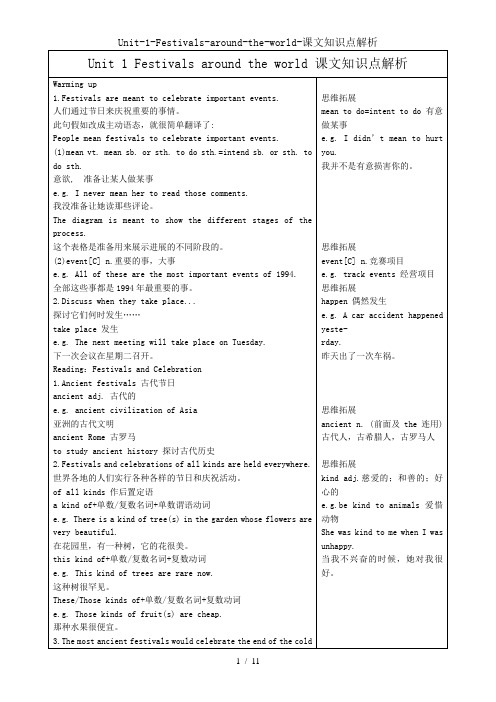
7....when people should go to clean the graves and light incense in memory of their ancestors.
……这时候,人们去扫墓,点上香火祭祀祖先。
memory[ C usually plura] n. 表示所记住的事情,记忆
starve vt.&vi. 挨饿,饿死
e.g. Thousands of people will starve if food doesn’t reach the stricken city.
假如食物无法到达这座受灾的城市,成千上万的人将会饿死。
5.They lit fire and made music because they thought these festivals would bring a year of plenty.
他们把食物, 鲜花和礼物献给死者。
offer sth. to sb.= offer sb.sth.供应某物给某人
e.g. He offered me 300 dollars for that television.
他出300美元向我买那部电视机。
12.The festival of Halloween had its origin as an event in memory of the dead.
万圣节起源于纪念已逝的人们。
had its origin as an event 起源于某事
have your or its origin=begin 开始
e.g.Many of the problems had their origin in post-war Europe.
Unit 1 Festivals around the world (2)
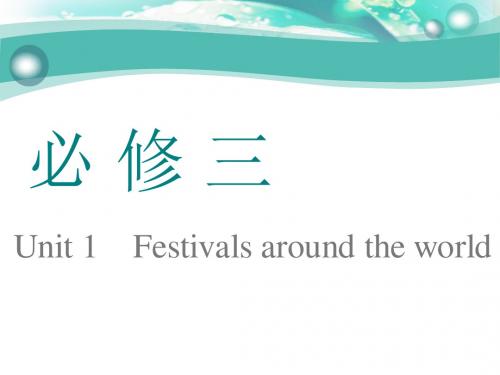
7. fool n. vt. vi. adj.
8. wipe vt. 9. weep vi.
n.
愚人;白痴;受骗者 愚弄;欺骗 干傻事;开玩笑 傻的 擦;揩;擦去 哭泣;流泪 哭;哭泣
返回
核心单词练通
1.(2018•6月浙江高考写作)From that voluntary activity, not only did I broaden my horizons but also gained (获得) some
返回
Ⅰ.阅读词汇(英译汉)
1.seasonal adj.
季节的;季节性的
2.ancestor n.
祖先;祖宗
3.feast n.
节日;盛宴
4.skull n.
头脑;头骨
5.bone n.
骨;骨头
6.rooster n.
雄禽;公鸡
7.carnival n.
狂欢节;(四旬斋前的)
饮宴狂欢;嘉年华(会)
_c_u_s_t_o_m__s_ (风俗).
返回
6.The people gathered (聚集) round, curious to know what was happening.
7.The studies find that people who are able to forgive (原谅) feel less stress and less depression.
5.Since the country gained its independence , it has been _in__d_e_p_e_n_d_e_n_t_ of any powerful country.(independence)
教案4:Unit 1 Festivals around the world
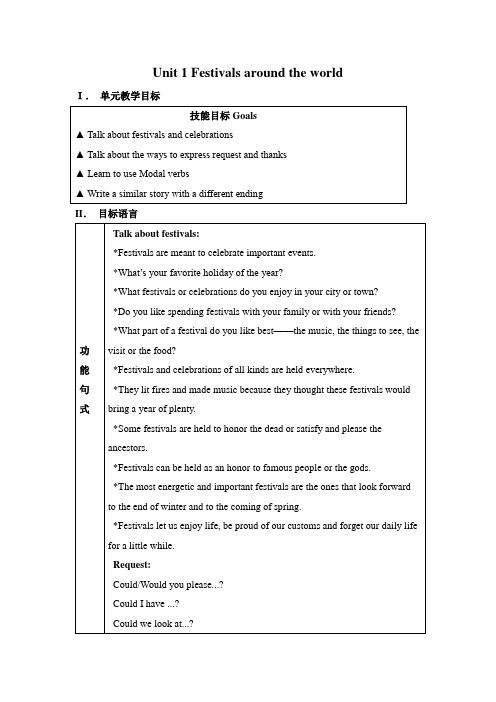
Unit 1 Festivals around the world I.单元教学目标II.目标语言III. 教材分析与教材重组1. 教材分析本单元以节日为话题,介绍古今中外节日的种类、由来、意义以及人们的活动和习俗,旨在通过本单元的学习使学生不但了解我国的节日,而且对外国的节日也有所了解,进而拓展社会文化背景、增加跨国文化知识;使学生复习和巩固运用请求和感谢的表达法,掌握情态动词的用法;并尝试根据阅读的文章写一个不同的结局,能表达自己的观点和想法。
1.1 Warming Up 旨在通过表格引导学生讨论并列举出五个我国节日的日期、庆祝内容和民俗。
可以刚刚过去的春节为话题导入对节日的讨论;使他们由自己的经历谈起,扩展到别的节日以及外国的重要节日,激发学生的兴趣,激活他们关于节日的背景知识,为本单元的学习做准备。
1.2 Pre-reading是Reading 的热身活动。
主要通过两个问题引导学生思考并讨论自己最喜欢的节日及欢度方式,进而了解学生对节日的认识,以便为阅读作好铺垫。
1.3 Reading 的五篇小短文分别介绍古代节日、亡灵节、纪念名人的节日、丰收节、春天的节日等,使学生了解各种节日的由来及其存在的意义。
此部分载有Festivals的重要信息,还呈现了大量的词汇和主要的语法---情态动词的用法。
处理时应作为重点、整体处理,通过上下文来教词汇、语法,并引导学生分析长句、难句和复杂句。
1.4 Comprehending是考察对阅读内容的进一步理解。
练习一:六个问题让学生对文章内容有浅层理解并考察课文细节,但又不能仅仅拘泥于课文,要引导学生理解课文内容的基础上联系现实生活。
练习二:要求学生讨论哪些节日是最重要的,哪些是最有趣的,以表格的形式检查学生对所读节日的理解,并训练他们举一反三的归纳和推理能力。
练习三:要求学生找出各种节日共有的三件事,然后讨论为什么这些事对各地的人们都很重要。
这就要求学生不仅要温习文章内容而且要结合实际,阐述自己的想法,挖掘学生的思维能力和语言表达能力。
中职英语(高教版)教案:Unit1-Festivals-around-the-world(全6课时)

编号:
备课组别
英语组
课程名称
英语
所在
年级
主备
教师
授课教师
授课系部
授课班级
授课
日期
课题
Unit1Festivals around the world
Warming up & Listening and Speaking(1)
教学
目标
1.To learn words and phrases aboutfestivals:celebrate,reunion, fall,lunar,bright,
Talk about the pictures and match them with the right picture.
教
学
内
容
教
学
内
容
Thanksgiving Day:USA & Canada/the fourth Thursday in November & the second Monday in October/give thanks for the food and other good things people enjoy in life/get together to have a big family meal/turkey
vals around the worldListening and Speaking(2)
教学
目标
1.Ss can elicit information about festivals by listening activity.
2.Ss caninvite foreign friends to Chinese festival celebrations.
高中英语 Unit 1 Festivals around the world Section Ⅲ U
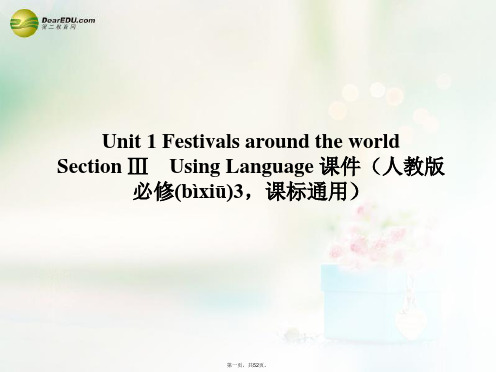
D.makes up his mind
解析 考查动词短语。句意:他表现得好像是一个值得信赖
的人,但事实上他很少遵守诺言。keep one's word“守信用; 履 行 诺 言 ” , 符 合 题 意 。 calm down 意 思 为 “ ( 使 ) 平 静 (píngjìng);(使)镇定”;change one's mind意思为“改变主 意”; make up one's mind意思为“下定决心”。 答案 B
If you run very fast, you will ________ ________ ________. ②经过训练,一个人发现较容易在水中屏息四十秒钟。
A person finds it easier ________ ________ ________ ________ under water for 40 seconds through training. ③他上气不接下气地上了车。 He was ________ ________ ________ after getting on the bus. 答案 ①lose your breath ②to hold his breath ③out of breath
第三页,共52页。
Ⅱ.教材研读 一、重点单词熟记(shú jì) 1.________n.(汽车等)停放 2.________ vi. 道歉;辩白 3.________ vt.&vi.淹没;溺死;淹死 4.________ n.悲哀;悲伤 5.________ adj.明显的;显而易见的 6.________ vt.擦;擦去 7.________ vt.&vi.编织;(使)迂回前进
第十三页,共52页。
M3 Unit1 festivals around the world word study

Find out the synonyms
take place gather satisfy honor energetic
look forward to have fun with in memory of
Tomb-sweeping Festivals
Translation
每年4月 号是清明节 号是清明节, 每年 月5号是清明节,清明节是为了纪念死 者,缅怀祖先。在那天,家庭成员聚在一起,扫 缅怀祖先。在那天,家庭成员聚在一起, 墓,上供,焚香,祭慰逝者。 上供,焚香,祭慰逝者。 逐渐地,人们为这个传统节日增加了更有 逐渐地, 活力的内容。许多人外出,走进大自然, 活力的内容。许多人外出,走进大自然,希望玩 得开心。 得开心。 节日不仅能让人回想起过去, 节日不仅能让人回想起过去,还能让人享 受现在的生活。 受现在的生活。
Translation
每年4月 号 清明节,清明节是为了纪念 纪念死 每年 月5号是清明节,清明节是为了纪念死 者,缅怀祖先。在那天,家庭成员聚在一起,扫 缅怀祖先。在那天,家庭成员聚在一起, 祖先 聚在一起 墓,上供,焚香,祭慰逝者。 上供,焚香,祭慰逝者。 逝者 逐渐地,人们为这个传统节日增加了更有 逐渐地,人们为这个传统节日增加了更有 活力的内容。许多人外出,走进大自然,希望玩 活力的内容。许多人外出,走进大自然,希望玩 的内容 得开心。 得开心。 节日不仅能让人回想起过去, 节日不仅能让人回想起过去,还能让人享 回想起过去 受现在的生活。 受现在的生活。
Valentine’s Day
So he outlawed(宣布 不合法 marriage for young 宣布…不合法 宣布 不合法) men. Valentine wasn’t satisfied with this. He married (主婚 young couples secretly. When Emperor 主婚) 主婚 Claudius II found out it, he had him put to death. Perhaps we'll never know the true story behind the man named St. Valentine, but February has been the most energetic and important month that many lovers look forward to celebrating love and having fun with each other for a long time, dating clear back to the Middle Ages. In fact, Valentines ranks second only to Christmas in number of greeting cards sent.
《高一英语课件:Unit1Festivalsaroundtheworld》
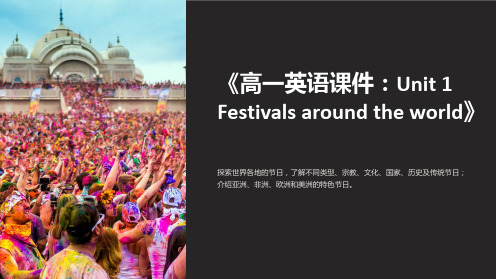
4 Historical Festivals
Reenacting or remembering historical events or periods.
Festivals aroundthe world
1
China: Spring Festival
Experience the awe-inspiring
Holi
Join the fun-filled festivities of colors, water balloons, and joyous dances during the Festival of Spring.
Raksha Bandhan
Experience the bond of love and protection between brothers and sisters through tying of rakhi.
2 ReligiousFestivals
Observing and honoring religious beliefs and significant events.
3 National Festivals
Commemorating national achievements, independence, or important historical moments.
Reasons for Celebrating Festivals
1 CulturalPreservation
Preserve and pass down cultural traditions, customs, and rituals to future generations.
2 Community Bonding
必修三unit1festivals around the world section A 课文

May Day Dragon Boat Festival
Children’s Day Army’s Day
National Day
Teachers ’ Day
Mid-Autumn Festival
Happy New Year!
Spring
Festival
Easter
Good Friday April Fool’s Day Mother’s Day Father’s Day Labor Day Halloween Thanksgiving Day Ramadan Christmas Day
复活节前的星期五 4 月1日 5月的第二个星期日 6月的第三个星期日 5 月1日 10月31日 11月的第四个星期4 穆斯林历的第9个月 12月25日
• Spring Festival is the traditional Chinese New Year’s Day. It usually falls in early February. And the celebration lasts from the first day to the fifteenth day of the first lunar month.
Christmas
耶稣,又称为基督,是“基督教”的创始人和 中心人物。每年12月25日的圣诞节是基督徒 纪念耶稣降生的节日。
Foreign Festivals
名称 情人节 英文名称 Valentine’s Day 月份 2月14日
3月21日或此日后月圆的第一 个星期日
复活节
耶稣受难日 愚人节 母亲节 父亲节 劳动节 万圣节 感恩节 斋节 圣诞节
人教版必修三Unit1 《Festivals around the world》word教案6

Book 3 Unit 1Festivals around the worldIII. 教材分析与教材重组1. 教材分析本单元以节日为话题,介绍古今中外节日的种类、由来、意义以及人们的活动和习俗,旨在通过本单元的学习使学生不但了解我国的节日,而且对外国的节日也有所了解,进而拓展社会文化背景、增加跨国文化知识;使学生复习和巩固运用请求和感谢的表达法,掌握情态动词的用法;并尝试根据阅读的文章写一个不同的结局,能表达自己的观点和想法。
1.1 Warming Up 旨在通过表格引导学生讨论并列举出五个我国节日的日期、庆祝内容和民俗。
可以刚刚过去的春节为话题导入对节日的讨论;使他们由自己的经历谈起,扩展到别的节日以及外国的重要节日,激发学生的兴趣,激活他们关于节日的背景知识,为本单元的学习做准备。
1.2 Pre-reading是Reading 的热身活动。
主要通过两个问题引导学生思考并讨论自己最喜欢的节日及欢度方式,进而了解学生对节日的认识,以便为阅读作好铺垫。
1.3 Reading 的五篇小短文分别介绍古代节日、亡灵节、纪念名人的节日、丰收节、春天的节日等,使学生了解各种节日的由来及其存在的意义。
此部分载有Festivals的重要信息,还呈现了大量的词汇和主要的语法---情态动词的用法。
处理时应作为重点、整体处理,通过上下文来教词汇、语法,并引导学生分析长句、难句和复杂句。
1.4 Comprehending是考察对阅读内容的进一步理解, 该部分设置了六项练习。
练习1:表格列出了四种类型的节日,要求学生依据课文内容,填写相应的节日名称和国家,主要检查学生对课文整体内容的理解情况。
练习2:要求学生根据课文内容回答若干个问题。
练习3:表格填充练习,要学生先在两人小组内讨论,然后按照课文内容列出不同节日的共同点,以及节日对世界各地人民意义重要的原因。
练习4:要求学生以两人小组的形式讨论“哪些节日最重要,哪些最有趣”,然后填写表格,填充内容是节日的类型,具体实例和选择这些节日的个人理解,共同合作,完成任务。
- 1、下载文档前请自行甄别文档内容的完整性,平台不提供额外的编辑、内容补充、找答案等附加服务。
- 2、"仅部分预览"的文档,不可在线预览部分如存在完整性等问题,可反馈申请退款(可完整预览的文档不适用该条件!)。
- 3、如文档侵犯您的权益,请联系客服反馈,我们会尽快为您处理(人工客服工作时间:9:00-18:30)。
Extensive reading A Sad Love Story
By Rhyme December
20110218
重点词汇和短语
1. heart-broken, 2. turn up, 3.keep her word, 4. fool, 5.hold one’s breath, ’ 6.apologize, 7.drown one’s sadness, ’ 8.in coffee, obvious, 9.wipe, 10. lovely,
3. How did Li Fang know the manager wanted to shut the coffee shop?
The manager wiped the tables and thensat down and turned on the TV.
Answer the questions
on the seventh day of the seventh lunar month.
• 4.Hu Jin had been waiting for Li Fang for a long time with a gift for him. T
Answer the questions
• • • • • • 1. Why was the TV story what Li Fang needed?
• 2. Because her most lovely daughter got married to T human secretly, the a Goddess got very angry.
True or false
• 3. Zhinü was made to return to Heaven without her husband. They were allowed to meet once a year on the seventh day of the tenth lunar month.F Zhinü was made to return to Heaven without • her husband. They were allowed to meet once a year
Listening course on page 6 CARNIVAL IN TRINIDAD
• Keys to Part 1.
• 1.Li Mei's clothing is too thick and her shoes are not comfortable enough to walk in for a long time. • 2.Carla suggests that Li Mei change her shoes to something more comfortable,wear some lighter and cooler clothing and also take a hat.
True or false
• 1. The girl Li Fang loved and waited for didn’t turn up. But he didn’t lose ’ ’ F heart.
in coffee.
girl Li waited • Thehe lost Fang loved andhe wouldfor didn’t turn up. So heart,because drown his sadness
• Keys to part 2. • 3.It's important for them to have water because it is very hot and they will be doing a lot of walking. • 4.It's difficult for them to hear each other because the music is very loud. • 5.They plan to meet at the parking lot at 8 o'clock because they might get separated in the crowd.
重点词汇和短语
11.fell in love, 12.couple, 13.make a bridge of their wrings, 14.weeping, 15.set off for, 16.remind somebody of something, 17.forgive, 18.warm up, 19.the ice sculptures
The TV story was a sad story about lost love-the same situation as Li Fang.
2. What was Li Fang afraid that Hu Jin was doing?
He was afraid that she was with her friends laughing at eople want the weather to be fine on Qiqiaojie?
People want the weather to be fine so they can meet the one they love.
• • • • •
5. What is the reason why Li Fang and Hu Jin did not meet on time? Li Fang waited in They did not meet on time because
the coffee shop and Hu Jin waited in the tea shop.
6. Why was Li Fang so worried at the end of the story?
He was worried because he had thrown away the gifts for Hu Jin--the chocolates and roses so he had nothing to give her and he thought she would not forgive him.
重点句子
• 1. She could be with her friends right now laughing at him. • 2. It was obvious that the manager of the coffee shop was waiting for him to leave—he wiped the tables, then sat down and turned on the TV—just what Li Fang needed! • 3. So he did. • 4. If you come you must be prepared to keep moving, as it is too cold to stand and watch for long.
